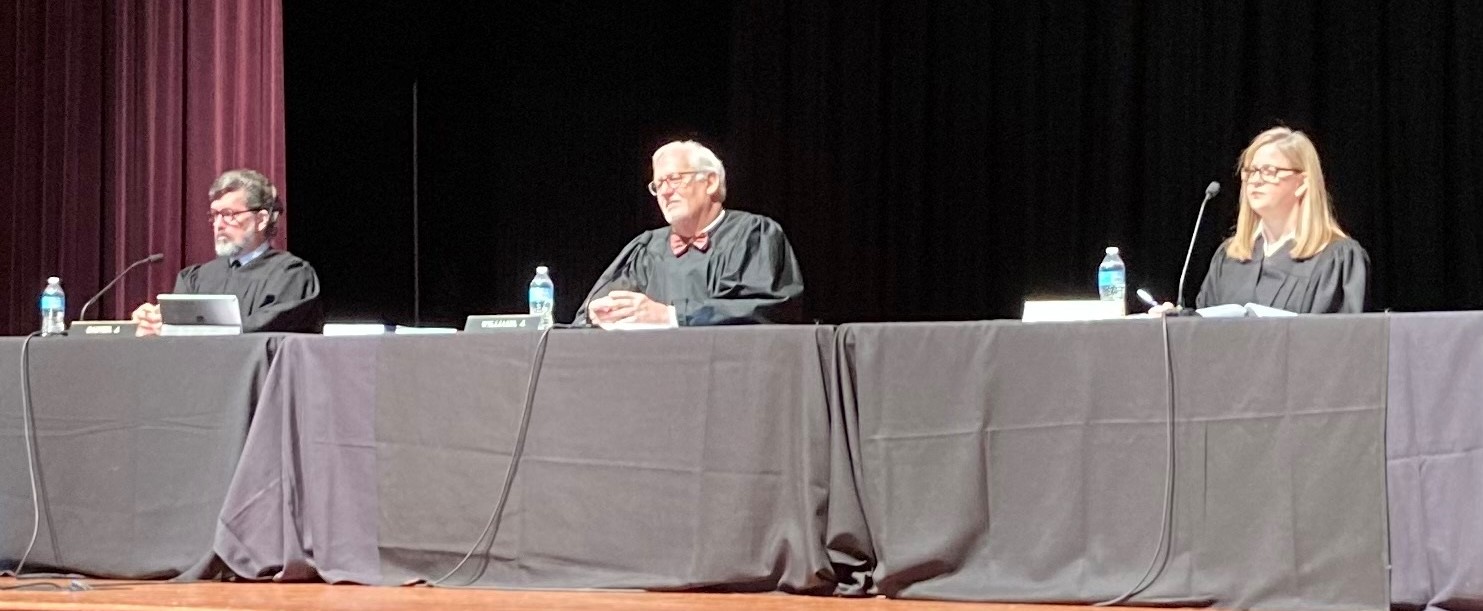Court of Criminal Appeals Judges John Everett Williams, Tim Easter and Jill Ayers heard oral arguments for three cases inside Lipscomb University’s Collins Alumni Auditorium on February 9.
“We like to go out into the various campuses, or wherever we’re invited, to let the students see real cases in real time,” said Judge Williams, Presiding Judge of the CCA. “They seem to enjoy it and we are often asked to come to beautiful facilities, like here at Lipscomb University, and it’s just a fun time for us when we’re doing serious work.”
The Court of Criminal Appeals usually hears its cases at one of the three Supreme Court buildings located in Knoxville, Nashville, and Jackson.
“I love bringing court to the students because they are probably not going to take the time to come down to the Supreme Court building and watch oral arguments, so it’s fun when we can bring it to them and let them see it live in action, and have the chance to interact and ask questions and have that little casual time,” Judge Ayers said. “We don’t get that very often, so I enjoy that part.”
While oral arguments are always open to the public, regular court sessions often only draw and handful of viewers with a particular interest in the case.
“I think it’s good for the lawyers, too, to have a different venue like this,” Judge Easter said. “It seems like attorneys do a better job when they have more of an audience like these students who are interested in looking at going to law school. It is good for everybody concerned, but especially the students.”
The Court of Criminal Appeals has alternated between hearing cases in-person and virtually since the start of the COVID-19 pandemic.
“This is actually only my third time to sit live,” Judge Ayers said. “I was appointed during Covid and have only had two other in-person hearings, so I’m probably the most excited to be able to be here and participate.”
Following the oral arguments, Lipscomb University students were invited to ask questions ranging from “How do you go about preparing oral arguments like these?” to “How do you make use of your judicial law clerks and what qualities do you look for when deciding to hire someone as a law clerk?”
“I’m looking for someone who writes clearly, concisely and correctly,” Judge Easter said. “Those three things. I want to see writing samples when they come in for an interview. I want to find someone who can get to the point because the first thing anybody notices when they pick up a brief or an opinion is how long it is. That drives everything, so it needs to be clear, concise and correct.”
One student asked, “Sometimes a judge’s judicial philosophy can spark controversy, so how do you go about approaching a case where you put aside your own political opinions and you focus solely on the situation and the case law in front of you?”
“It’s very easy once you get into it, just like arguments today, especially since we’re an error-correcting court and not a policy-making court,” Presiding Judge Williams said. “The Supreme Court does that for us these days. I may very well love an argument and I may very well write an opinion that says this really sounds good, as I’ve done a couple times, but I didn’t take this position here. The lawyer has to carry it up to the Supreme Court where they changed the policy.”
Judges take an oath to uphold the constitutions of the United States and State of Tennessee.
“We have to follow the law, whether we agree with it or not,” Judge Easter said. “We tell juries to do that all the time as a trial judge.”
Another student asked, “Is there any final advice anyone would like to give for anyone interested in a career in law?”
“Take advantage of any opportunities to intern in any jobs,” Judge Ayers said. “I wanted to go to law school, but didn’t really know any lawyers, didn’t have any in my family, so my senior year of college I became a runner at a law firm. I said, ‘If I’m going to do this, I need to see what it looks like on a day to day basis.’ Three years of law school and all that money is a lot to invest and to then find out ‘oh, gosh, I didn’t want to do this.’ Just get exposed to it, so you know what you’re getting into.”
Budding law students should also consider their motivation for a career in the law.
“You normally meet people who are in crisis,” Judge Easter said. “And, if you’re a person who loves your neighbor, what a great way to help somebody out. By becoming a lawyer, you can help people through some of the worst days they will ever experience.”
The Court of Criminal Appeals consists of 12 judges – four from Tennessee’s eastern section, four from the middle section and four from the western section. Judges Ayers and Easter represent the middle section. Presiding Judge Williams represents the western section. Court of Criminal Appeals judges are elected on a “retain-replace” ballot every eight years.
All Court of Criminal Appeals decisions may be appealed to the state Supreme Court by permission, except in capital cases, which are appealed automatically. No witnesses, juries or testimonies are present in the Court of Criminal Appeals. Instead, attorneys present oral and written arguments.



